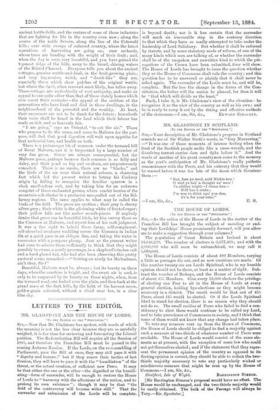THE HOUSE OF LORDS.
[TO THE EDITOR OF THE "SPECTATOR."]
Sin,—As the action of the House of Lords in the matter of the Franchise Bill has brought the subject of mending or end- ing their Lordships' House prominently forward, will you allow me to make a suggestion through your columns?
The population of* Great Britain and Ireland is about 34,848,239. The number of electors is 3,077,489; and with the 2,000,000 who will soon be enfranchised, we may call it 5,080,000.
The House of Lords consists of about 480 Members, varying a little as peerages die out, and as new creations are made. Of this number twenty-six are Lords Spiritual, who in my humble- opinion should not be there, at least as a matter of right. Sub- tract the number of Bishops, and the House of Lords consists of about 455 Members. Give every 12,000 electors the privilege of electing one Peer to sit in the House of Lords at every general election, holding bye-elections as they might become necessary in a district. The result would be that out of 455. Peers, about 4.45 would be elected. Or if the Lords Spiritual liked to stand for election, there is no reason why they should not do so. The small residue of Peers who failed to find a con- stituency to elect them would continue to be called my Lord, and to take precedence of Commoners in society, and I think that some of them would not know that any change had taken place.
To veto any measure sent up from the House of Commons, the House of Lords should be obliged to find a majority against such a measure of two-thirds of whatever number of Peers were available. The House of Lords would consist of the same ele- ments as at present, with the exception of some few who could not get themselves elected ; and if the statement that they repre- sent the permanent opinion of the country as opposed to its fleeting opinion is correct, they should be able to collect the two- thirds majority necessary to veto any particularly wicked or- mischievous measure that might be sent up by the HODB8 of Commons.—I am, Sir, Sie.,
[Sir Barrington Simeon's proposal would have no effect. The- House would be unchanged, and the two-thirds majority would be easily obtained. The bulk of the Peerage will always be Tory.—En. Spectator.]


































 Previous page
Previous page